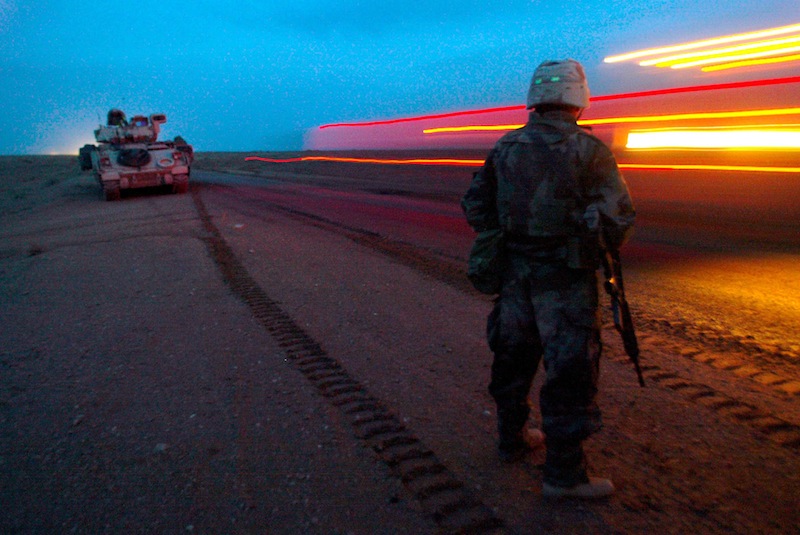Amid the frenzied posturing of the last 72 hours before the shutdown, a bill claiming to ensure that active-duty military would receive the pay and support they need to continue to provide for our national security zipped rapidly and uncontroversially through both houses and the President’s pen. The bill seemed to meet Senator Ted Cruz’s call for the House to pass “mini-CRs” [continuing resolutions] to fund aspects of government it liked – Pentagon, FAA, pandacam – while letting the rest close.
This willful blindness about how government actually works – indeed, how large corporations, technology and just about everything functions in our age of complexity – meets its full irresponsibility in understanding what it takes to support the men and women who have volunteered to take a bullet in the name of each of us, our Constitution, and yes, our democratically-elected government, each and every miserable one of them. These are just a few examples:
Combat operations need intelligence to “see”: the wonders of technology, and 9/11 Commission recommendations on breaking down firewalls between government agencies, mean that soldiers in Afghanistan depend on real-time intelligence from civilian agencies for planning and targeting, and for their own security. The CIA, however, is being treated like every other civilian agency – some of its staff will be allowed to work, but many more will not, taking away the backstopping that troops depend on. Sen. Richard Durbin (D-IL) described the shutdown as likely to “cripple the intelligence community.” Are Congressional Republicans really saying that some large swathe of our intelligence establishment is unnecessary? Look to see whether they follow through on that at budget time. (Oh, and speaking of intelligence: do we really want to shut down the Centers for Disease Control as flu season begins? But I digress.)
A deployed soldier’s first concern is family back home: So G.I. Jane gets her few hundred bucks a week of base pay, but the civilians who teach at her kids’ base school are furloughed and the school shuts down. When will she get paid – in time to make the mortgage? The VA civilians who process the backlog of disability claims her veteran husband is stuck in? They’re non-essential, and not working. And the Pentagon has made it clear that nobody goes anywhere during a shutdown. The unit that was supposed to replace hers? They’re not training. Will she be home for Christmas? She doesn’t know. The Army doesn’t know. Congress can’t tell her. Is this what we meant by “serve your country?”
Military operations depend on civilians: Without civilians to process travel orders, soldiers can’t get home to their families, or deploy to their units. Without civilians to drive trucks, or load and unload boats and trains, equipment can’t move, and units can’t train and deploy – which means units in combat must keep sitting where they are. Without civilians to manage relationships with contractors, everything from food services to guard services suffers. Oh, and about those civilians: the Pentagon is not sure where funds to pay uniformed servicemembers will come from if the shutdown continues past Oct. 7.
The world’s strongest? U.S. power and influence in the world are based not just on the sheer size and quality of our economy, our military, our innovation, but also the confidence of our friends and foes alike that we will do what we say, play by our own rules, act in our declared self-interest. Now imagine you’re the captain who has to explain to his Afghan Army counterparts that the equipment isn’t coming, or the intelligence is dated, or the high-level briefing will be conducted via Skype from Washington because… uh, because why again? The most powerful nation, the greatest democracy, what? Or you’re the military attaché who must explain to Israelis and Palestinians that the government funded him to show up for work, but not his State Department counterpart? Now imagine you’re Vladimir Putin, or an angry twentysomething in an Al Qaeda chat room. The great superpower can’t manage to keep its law enforcement, intelligence and diplomacy teams on the job?
So, if you’re wearing a uniform for your country Tuesday morning, sure, you’re grateful to be getting paid while the civilian in the next cubicle and/or foxhole is not. But are you getting what you need to do your job, and is the episode inculcating the respect for civilian authority on which armed forces in healthy democracies depend? Uh, not so much.
Heather Hurlburt is the Executive Director of the National Security Network; during the 1995 shutdown she was a speechwriter for Secretary of State Warren Christopher, and deemed a non-essential employee.






